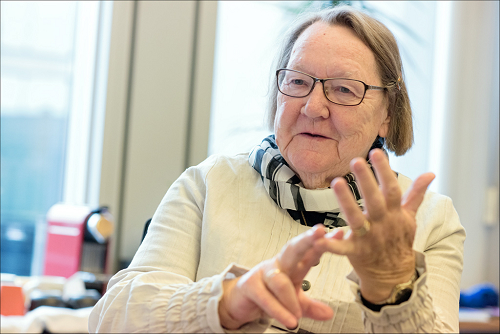Animal health: "The principle is the same whether you are taking care of a dog, a cat or 3,000 pigs"
A proposal to streamline and simplify complicated animal health rules in the EU was informally agreed by MEPs, the European Commission and the national governments on 1 June. Marit Paulsen, the Parliament's lead negotiator, described the result as "fantastic": "Its most important principle is to prevent rather than to cure." We talked to Paulsen, who has been pushing animal welfare issues for four decades, about her interest in animals and how the new rules will make a difference.

Marit Paulsen
Paulsen has managed her own farm and said her passion for animal welfare and food safety was spurred by her memories of growing up with food shortages in Norway during World War II: "I was a very hungry child for some years and my dream, once peace had been achieved, was to get food and to put on weight."
The measures agreed by Parliament and Council negotiators on Monday relate to diseases that are transmissible between animals and people, such as foot-and-mouth, bluetongue and avian influenza. With 13.7 million animal holdings in the EU, the value of livestock farming is €156 billion a year.
Paulsen said that the agreement puts disease prevention centre stage: "It entails issues such as biodiversity, good husbandry, food, technology and the use of medicine." The Swedish ALDE member also noted that 70% of all infectious diseases are common to both animals and humans.
With this proposal a large number of legal acts, some dating as far back as 1964, will be streamlined into one single piece of legislation: "This is an extremely good example for legislation on the European level," she said. "Citizens who work with animals, whether it is farmers, veterinarians or those working in slaughterhouses, can read this law because it is clear and understandable."
Paulsen said that the agreed rules will also affect pet owners: "The principle is the same whether you are taking care of a dog, a cat or 3,000 pigs."
The agreed text now needs to be voted on by Parliament's agriculture committee. The draft will also need to be approved by Parliament as a whole.
Source: European Parliament
- 958 reads
Human Rights
Fostering a More Humane World: The 28th Eurasian Economic Summi

Conscience, Hope, and Action: Keys to Global Peace and Sustainability

Ringing FOWPAL’s Peace Bell for the World:Nobel Peace Prize Laureates’ Visions and Actions

Protecting the World’s Cultural Diversity for a Sustainable Future

Puppet Show I International Friendship Day 2020

